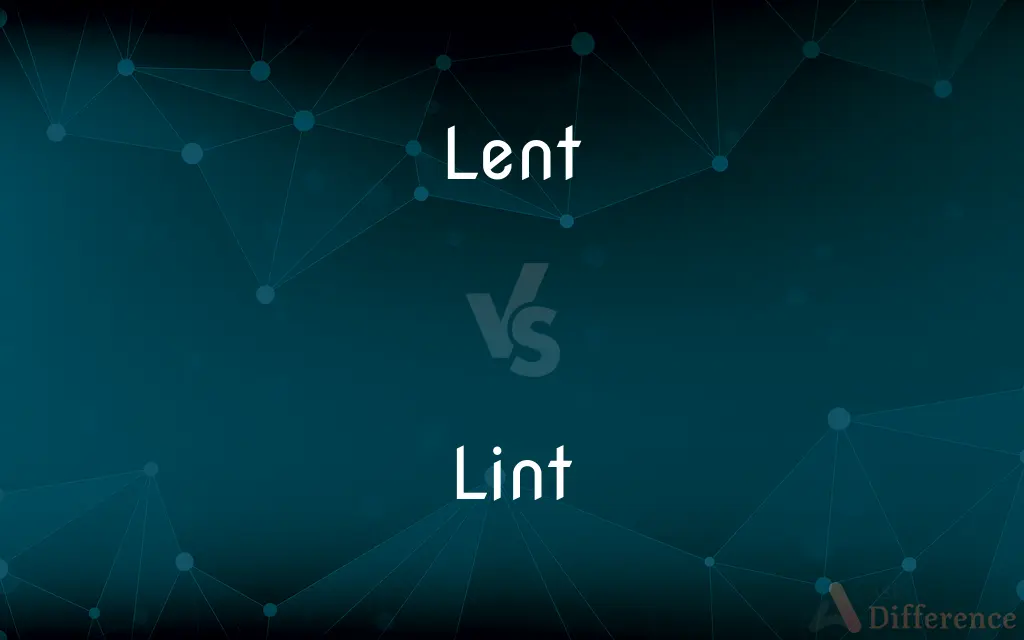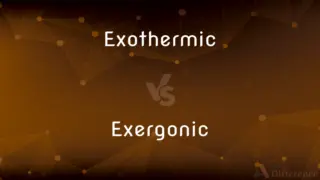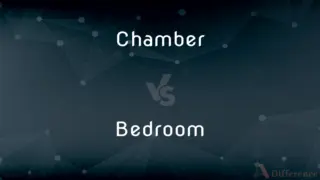Lent vs. Lint — What's the Difference?
By Tayyaba Rehman & Fiza Rafique — Updated on March 13, 2024
Lent is a Christian period of fasting and penance before Easter, focusing on reflection and preparation, whereas lint refers to the fine fibers and fluff collected on clothes or in pockets, often seen as a nuisance in laundry.

Difference Between Lent and Lint
Table of Contents
ADVERTISEMENT
Key Differences
Lent marks a significant period in the Christian calendar, observed for 40 days leading up to Easter, dedicated to fasting, prayer, and almsgiving, symbolizing Jesus' 40 days in the desert. It is a time for believers to reflect on their lives and prepare spiritually for Easter. Whereas lint, unrelated to any religious or spiritual practice, is the accumulation of small fibers and dust that gather on clothing, linens, and in the pockets of garments. It's often noticed after laundry and can be a minor annoyance requiring cleaning or removal with a lint roller.
Lent involves various practices such as fasting, abstinence, and penance, encouraging participants to give up certain luxuries or foods as a form of sacrifice and discipline. This period is meant to purify the body and mind, helping adherents grow closer to God. On the other hand, lint primarily concerns the realm of household chores and maintenance, requiring physical cleaning to remove unwanted fibers that may cling to fabrics, potentially even affecting the performance and lifespan of laundry appliances.
While Lent has deep spiritual significance and aims to enhance one's faith and moral discipline, contributing to personal growth and communal harmony within the Christian tradition, lint represents a mundane aspect of daily life, highlighting the need for regular cleaning and maintenance of clothing and textiles to maintain their appearance and hygiene.
Lent's observance can vary among different Christian denominations, with varying practices regarding fasting and abstinence, reflecting diverse theological interpretations and traditions. It is a period rich in rituals and community activities, such as prayer meetings and charity work. Conversely, dealing with lint is a universal, practical concern that crosses cultural and religious boundaries, involving simple cleaning techniques and tools like lint rollers and brushes.
Despite their vastly different contexts and implications, both Lent and lint feature in regular discourse, the former in religious and spiritual discussions and the latter in conversations about domestic life and laundry care. Each highlights a unique aspect of human experience—spiritual discipline and daily chores—underscoring the multifaceted nature of our lives.
ADVERTISEMENT
Comparison Chart
Definition
A period of fasting and penance in Christianity.
Fine fibers and fluff from fabrics.
Context
Religious, spiritual.
Domestic, clothing care.
Purpose
Spiritual purification, preparation for Easter.
Cleaning, maintaining clothing appearance.
Duration
40 days before Easter.
Continuous, noticed after laundry.
Associated Practices
Fasting, prayer, almsgiving.
Using lint rollers, cleaning dryers.
Compare with Definitions
Lent
The time for Christians to reflect, fast, and prepare for Easter.
Lent is traditionally marked by fasting, both from food and festivities.
Lint
Fine fibers that separate from the surface of cloth or yarn, especially during washing.
She cleaned the lint filter of the dryer to improve its efficiency.
Lent
A liturgical period preceding Easter, emphasizing sacrifice.
Lent encourages believers to replicate Jesus' sacrifice and withdrawal into the desert for 40 days.
Lint
Small fluff or fuzz found on clothing.
He used a lint roller to remove the fuzz before his interview.
Lent
A period of religious observance in the Christian liturgical calendar leading up to Easter.
Many Christians observe Lent by giving up a particular luxury as a form of penitence.
Lint
Unwanted textile fibers that cling to clothes.
The black pants always seemed to attract more lint than other clothing.
Lent
A season of penance, reflection, and fasting which prepares believers for Christ’s Resurrection on Easter Sunday.
During Lent, participants often attend additional church services.
Lint
Accumulations of dusty fibers on fabrics.
After washing her sweater, she noticed a lot of lint had gathered.
Lent
A period for self-examination and spiritual growth.
She used Lent as a time to volunteer more and focus on personal growth.
Lint
Material collected in a lint trap or screen in a dryer.
Regularly removing lint from the trap is essential for fire safety.
Lent
Lent (Latin: Quadragesima, 'Fortieth') is a religious observance in the Christian liturgical calendar that begins on Ash Wednesday and ends approximately six weeks later; depending on the Christian denomination and local custom, Lent concludes either on the evening of Maundy Thursday, or at sundown on Holy Saturday, when the Easter Vigil is celebrated. Regardless, Lenten practices are properly maintained until the evening of Holy Saturday.
Lint
Clinging bits of fiber and fluff; fuzz.
Lent
(in the Christian Church) the period preceding Easter, which is devoted to fasting, abstinence, and penitence in commemoration of Christ's fasting in the wilderness. In the Western Church it runs from Ash Wednesday to Holy Saturday, and so includes forty weekdays.
Lint
Downy material obtained by scraping linen cloth and used for dressing wounds.
Lent
Past tense and past participle of lend.
Lint
The mass of soft fibers surrounding the seeds of unginned cotton.
Lent
A 40-day period of fasting and penitence observed by many Christians in preparation for Easter. In Western churches, Lent lasts from Ash Wednesday until Easter, usually excepting Sundays.
Lint
Clinging fuzzy fluff that clings to fabric or accumulates in one's pockets or navel etc.
Clean the lint out of the vacuum cleaner's filter.
Lent
Simple past tense and past participle of lend
Lint
A fine material made by scraping cotton or linen cloth; used for dressing wounds.
Lent
A fast of forty days, beginning with Ash Wednesday and continuing till Easter, observed by some Christian churches as commemorative of the fast of our Savior.
Lint
The fibrous coat of thick hairs covering the seeds of the cotton plant.
Lent
Slow; mild; gentle; as, lenter heats.
Lint
Raw cotton ready for baling.
Lent
See Lento.
Lint
To perform a static check on (source code) to detect stylistic or programmatic errors.
You should lint your JavaScript code before committing it.
Lent
A period of 40 weekdays from Ash Wednesday to Holy Saturday
Lint
Flax.
Lint
Linen scraped or otherwise made into a soft, downy or fleecy substance for dressing wounds and sores; also, fine ravelings, down, fluff, or loose short fibers from yarn or fabrics.
Lint
Fine ravellings of cotton or linen fibers
Lint
Cotton or linen fabric with the nap raised on one side; used to dress wounds
Common Curiosities
How can lint be removed?
Lint can be removed using lint rollers, brushes, or cleaning the lint trap in dryers.
What is lint?
Lint refers to the fine fibers and fluff that accumulate on clothing and fabrics, often noticed after laundry.
What causes lint on clothes?
Lint forms from loose fibers that separate from textiles during the washing and drying process.
Why is Lent important in Christianity?
Lent is important as it commemorates Jesus' 40 days in the desert, focusing on spiritual growth, discipline, and preparation for Easter.
Is lint harmful?
While generally not harmful, excessive lint can affect appliance efficiency and fire safety in dryers.
What are common items given up for Lent?
Common items given up for Lent include sweets, alcohol, and other personal luxuries or indulgences.
What is Lent?
Lent is a Christian period of 40 days of fasting, prayer, and penance before Easter, focusing on spiritual reflection and discipline.
Can Lent practices vary among Christians?
Yes, Lent practices can vary widely among different Christian denominations and cultures, reflecting diverse interpretations and traditions.
Do all Christians observe Lent?
While many Christians observe Lent, practices and observance levels can vary significantly across different denominations and individual beliefs.
How do Christians observe Lent?
Christians observe Lent through fasting, prayer, abstinence, and almsgiving, reflecting on their faith and preparing for Easter.
Can lint affect laundry machines?
Yes, lint buildup can hinder the performance of laundry machines and pose a fire risk if not regularly cleaned.
How long does Lent last?
Lent lasts for 40 days, not including Sundays, leading up to Easter Sunday.
What symbolizes the beginning of Lent?
Ash Wednesday marks the beginning of Lent, symbolized by the distribution of ashes on the foreheads of believers.
Why is it important to clean lint from dryers?
Cleaning lint from dryers is crucial for maintaining efficiency and preventing potential fire hazards.
What tools are best for removing lint?
Lint rollers, lint brushes, and vacuum attachments are effective tools for removing lint from clothing and textiles.
Share Your Discovery

Previous Comparison
Exothermic vs. Exergonic
Next Comparison
Chamber vs. BedroomAuthor Spotlight
Written by
Tayyaba RehmanTayyaba Rehman is a distinguished writer, currently serving as a primary contributor to askdifference.com. As a researcher in semantics and etymology, Tayyaba's passion for the complexity of languages and their distinctions has found a perfect home on the platform. Tayyaba delves into the intricacies of language, distinguishing between commonly confused words and phrases, thereby providing clarity for readers worldwide.
Co-written by
Fiza RafiqueFiza Rafique is a skilled content writer at AskDifference.com, where she meticulously refines and enhances written pieces. Drawing from her vast editorial expertise, Fiza ensures clarity, accuracy, and precision in every article. Passionate about language, she continually seeks to elevate the quality of content for readers worldwide.
















































